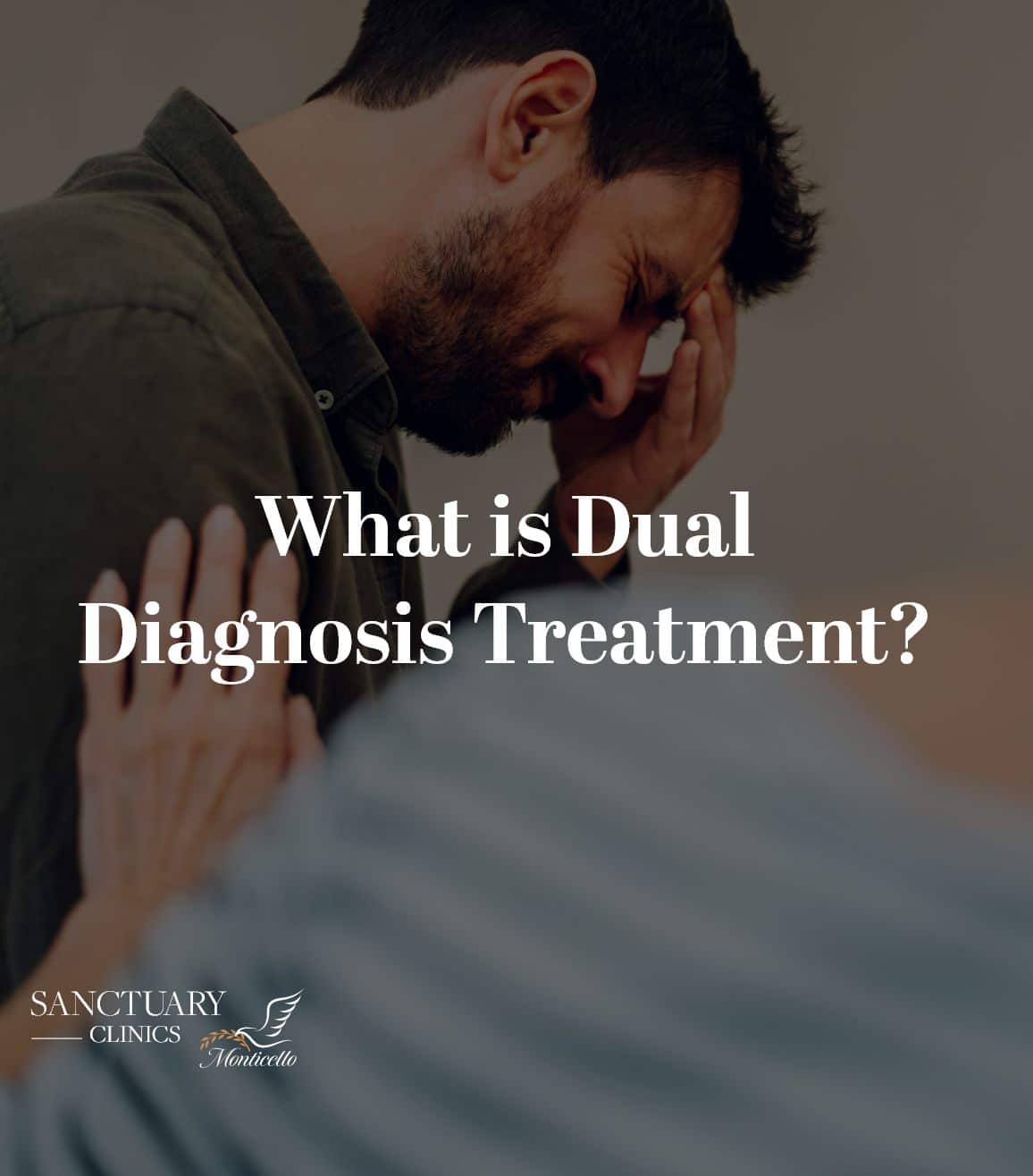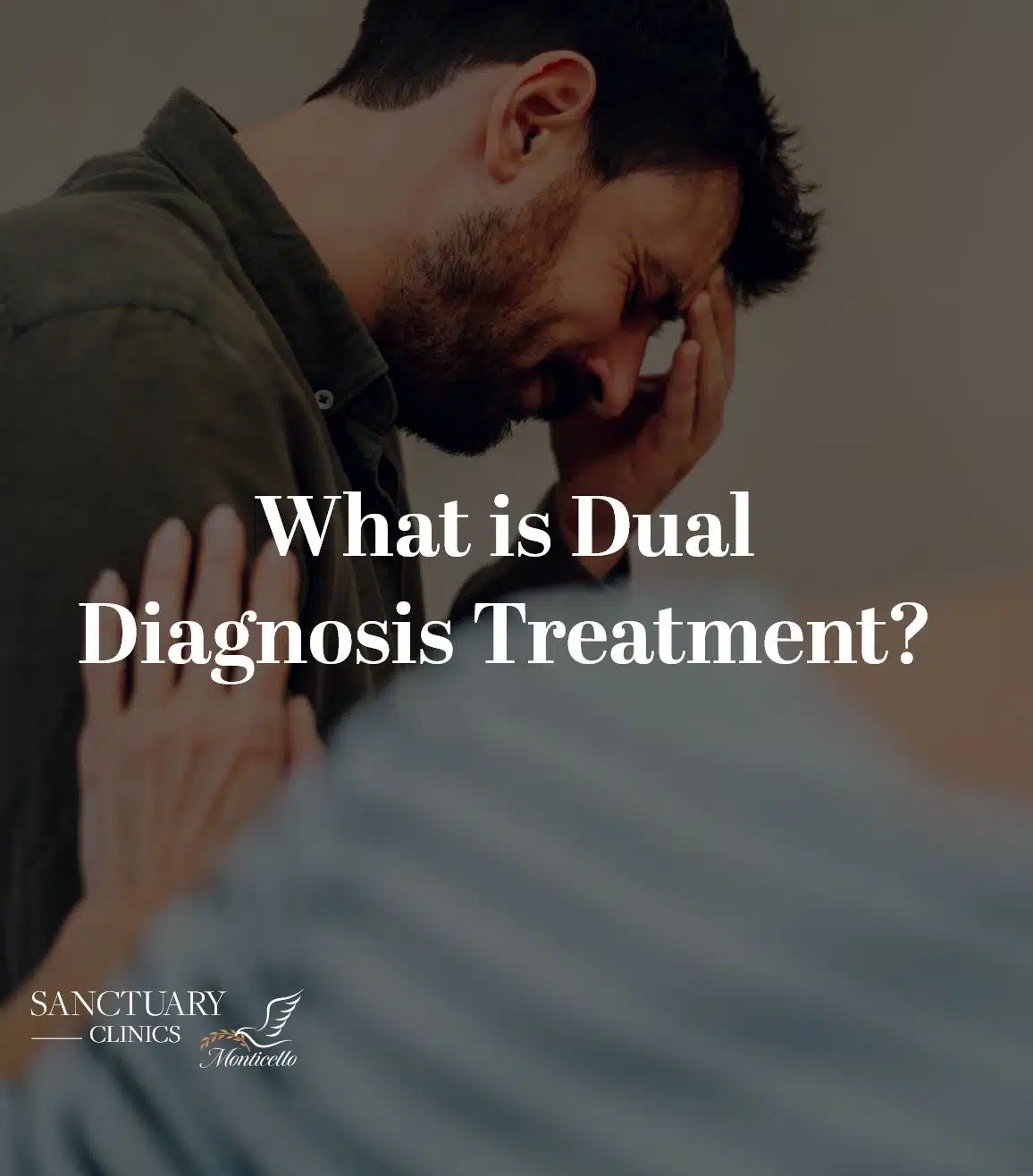

Contents
What is Dual Diagnosis Treatment?
Dual diagnosis treatment is an approach that addresses both a substance use disorder and mental health disorder. This treatment approach recognizes the interplay between mental health and substance abuse disorder. It understands that one can often exacerbate the other. Dual diagnosis treatment aims to provide comprehensive and holistic care. It does so by addressing both the addiction and the underlying mental health condition simultaneously.People with dual diagnosis face unique challenges and complexities. This is because the symptoms can interact and influence each other.For instance, substance abuse may be an attempt to self-medicate symptoms of a mental health disorder.
The goals of dual diagnosis treatment options are to:
At Sanctuary Clinics, We Always Try To Comfort And Accommodate Our Patients In The Right Way Possible. Navigating Through Substance Abuse Or A Mental Health Issue Is Never Easy And We Understand That. To Know More About Dual Diagnosis, Keep On Reading.
What is a Dual diagnosis assessment at a treatment center?
A Dual Diagnosis assessment at a treatment center evaluates an individual for both a mental health disorder and a substance use disorder.
This assessment aims to identify and diagnose co-occurring conditions and understand their interplay.
During the assessment, trained professionals conduct interviews. They also use standardized assessment tools and review the individual’s medical history and substance use patterns.
The assessment:
- Diagnoses specific mental health and substance use disorders.
- Tailors a personalized, integrated treatment plan.
- Assesses risk factors for safety concerns.
- Plans therapy, medication, and support interventions.
- Identifies triggers and underlying causes.
- Coordinates care among professionals.
- Tracks progress and adjusts the plan accordingly.
What is the most effective treatment for dual diagnosis?
The most effective treatment for dual diagnosis involves an integrated approach that simultaneously addresses both conditions.
There is no one treatment that will work effectively on every patient. Every individual has a different response to a treatment.
This is why a combination of treatments is necessary to address the conditions. Some key components of effective dual diagnosis treatment include:
- Integrated plan: Combining therapies, meds, counseling.
- Evidence-based treatment therapies: Cognitive Behavioral Therapy (CBT), Dialectical Behavior Therapy (DBT), and Motivational Interviewing (MI).
- Medication for symptoms and cravings. Supportive environment for recovery. Family involvement for support.
- Holistic practices like mindfulness, and yoga.
- Long-term care and follow-up. Coordinated care among professionals.
- Addressing underlying trauma.
- Dual diagnosis support groups for community.
- Trauma-informed care
According To The National Institute On Drug Abuse (NIDA), Roughly Half Of Individuals With A Substance Use Disorder Also Encounter A Mental Illness At Some Stage In Their Lives.
Therefore, Getting The Right Treatment Is Necessary. At Sanctuary Clinics, We Try To Get To The Core Of The Issue And Find Appropriate Treatments For Our Patients.
Why Is a Dual Diagnosis Treatment
Program Important?
Why Is a Dual Diagnosis Treatment Program Important?
A Dual Diagnosis Treatment Program is important because it recognizes the intricate relationship between mental health disorders and substance use disorders.
At a Dual Diagnosis Treatment Center, you get integrated care that addresses both aspects simultaneously. If you or a loved one is facing a dual diagnosis challenge, seeking treatment promptly is vital.
Addiction is a progressive condition, worsening with time, and if neglected, it can have fatal consequences. Here is why dual diagnosis so important:
- Comprehensive care: Treats co-occurring disorders holistically.
- Root causes: Addresses underlying contributors, reducing relapse risk.
- Better outcomes: Concurrent treatment improves quality of life.
- Relapse prevention: Curbs triggers from psychiatric disorder and substance use.
- Coping skills: Develops abilities for lasting resilience.
- Effective medication: Coordinated approach ensures proper use.
- Family support: Involves loved ones, crucial for recovery.
- Reduced stigma: Equal treatment lessens stigma.
- Long-term recovery: Equips for sustained healing.
What is the criteria for a dual diagnosis?
The criteria for a dual diagnosis, also known as co-occurring disorders, involve the presence of both a substance use disorder (addiction) and a mental health disorder in an individual. Here are the following points that help to understand whether a patient requires dual diagnosis:
- Meeting both mental health and substance use disorder criteria.
- Interconnected impact of both disorders.
- Significant impairment and distress in daily life.
- Chronic nature with cyclical patterns. Shared underlying factors like genetics or trauma.
- Simultaneous treatment of both disorders.
- Symptoms persist despite controlling substance use.
- Thorough assessment by a qualified mental health professional.
According to the NSDUH, 45% of individuals in the United States have a dual diagnosis. Symptoms of dual diagnosis, or co-occurring disorders, can vary widely depending on the specific mental health disorder and substance use involved. Here are some symptoms and signs to look out for:
- Mood swings, irritability, and anxiety.
- Trouble with daily tasks.
- Trouble concentrating, impaired judgment, memory issues.
- Social withdrawal, strained relationships.
- Escalating substance use for emotional relief.
- Work/school decline, neglecting responsibilities.
- Sleep problems, appetite changes, physical pain.
- Impulsive, risky behavior while under the influence.
- Excessive thoughts about substances or behaviors.
- Loss of interest in once-enjoyed activities.
- Unsuccessful attempts to cut down substance use.
- Denial of substance use or mental health impact.
- Legal/financial troubles due to substance use.
- Tolerance, withdrawal from substances.
What are the most common conditions with a dual diagnosis?
There are many common conditions with a dual diagnosis. Several mental health disorders commonly co-occur with substance use disorders in a dual diagnosis. Some of the most common conditions include:
- Depression
- Anxiety Disorders
- Bipolar Disorder
- Schizophrenia
- Post-Traumatic Stress Disorder (PTSD)
- Borderline Personality Disorder
- Attention-Deficit/Hyperactivity Disorder (ADHD)
- Eating Disorders
- Obsessive-Compulsive Disorder (OCD)
- Personality Disorders
- Generalized Anxiety Disorder (GAD)
People often wonder which one comes first: the mental health illness or substance abuse. Determining the starting point in common dual disorders is complex.
This is because each person’s journey to addiction or mental health issues is unique. Many seeking help for alcohol addiction also battle depression.
Initially, some turned to alcohol abuse to ease depression. But, escalating drinking worsened the symptoms. This led to alcohol addiction alongside the existing depression. Others, long-term drinkers, faced depression due to alcohol dependence. Excessive alcohol, a depressant, worsens depression over time. In both cases, effective treatment must address both addiction and depression simultaneously.
Therefore, substance abuse treatment and mental health treatment both are important. If you or a loved one are facing the challenges of dual diagnosis, remember that seeking help is a sign of strength. If things are getting worse, don’t hesitate to reach out – we’re here to provide the support and specialized care you need on your journey to healing.
At Sanctuary Clinics, we offer comprehensive dual diagnosis treatment to guide you toward a healthier and brighter future.
You don’t have to navigate this path to recovery alone.
What is the best treatment for dual diagnosis?
There is no one best treatment for dual diagnosis. A dual diagnosis program can have different results for different people. Every individual might have a different treatment that works best for them. That said, there are different types of individualized treatment plans available. Individual therapy is the way to go when dealing with dual diagnosis disorder. We have included a few of them.
Therapies for dual diagnosis:
- Cognitive Behavioral Therapy (CBT)
- Dialectical Behavior Therapy (DBT)
- Motivational Interviewing (MI)
- Contingency Management
- 12-Step Program
- Individual Counseling
- Group Therapy
- Family Therapy
- Trauma-focused Therapy
- Mindfulness-Based Therapy
- Psychoeducation
Holistic treatment for dual diagnosis
- Mindfulness Meditation
- Yoga Therapy
- Art Therapy
- Music Therapy
- Equine-Assisted Therapy
- Nutrition and Dietary Counseling
- Exercise and Physical Activity
- Acupuncture
- Massage Therapy
- Equine Therapy
- Aromatherapy
- Biofeedback
Medication treatment for dual diagnosis
- Psychotropic meds for mental health.
- Addressing substance withdrawal.
- Curbing cravings with medication.
- Coordinated treatment planning.
- Ongoing monitoring and adjustments.
- Patient education on meds.
How does dual diagnosis affect mental health?
Dual diagnosis can greatly affect mental health. Facing substance abuse issues, alcoholism, withdrawal symptoms or drug addiction is challenging.
This is especially when paired with mental health struggles. In co-occurring disorders, both mental health and addiction have distinct symptoms that disrupt work, relationships, and daily life. The interplay makes it tougher.
Untreated mental health worsens substance issues, and increased substance use intensifies mental health problems.
According to the Journal of the American Medical Association:
- Around 50% of those with severe mental disorders experience substance abuse.
- 37% of alcohol abusers and 53% of drug abusers have a serious mental illness.
- Among those diagnosed with mental illness, 29% abuse alcohol or drugs.
Here is how dual diagnosis can affect mental health:
- Worsening Symptoms: Substance use worsens mental health symptoms.
- Higher Risk: Increased risk of self-harm and suicide.
- Cycle of Impact: Mental health and substance use reinforce each other.
- Treatment Challenges: Substance use hampers mental health treatment.
- Risky Behavior: Impaired judgment leads to risky actions.
- Relapse Risk: Substance use triggers mental health relapses.
- Underlying Issues: Substance abuse masks underlying mental health concerns.
- Medication Interaction: Substance use conflicts with mental health medications.
- Isolation and Stigma: Increased isolation and stigma impact well-being.
- Coping Hurdles: Substance use replaces healthy coping mechanisms.
- Delayed Recovery: Complex interplay hinders mental health stability.
- Complex Diagnosis: Identifying symptoms becomes complicated.
At Sanctuary Clinics, we understand that your recovery journey will not be easy. But, for a successful recovery from psychological issues, what is required is the support of a treatment team.
You can get back to your productive life when you get the right treatment for your struggles. A Dual Diagnosis assessment is a critical step in providing a comprehensive approach and care to individuals with co-occurring disorders. It helps them achieve lasting recovery and improved overall well-being.
So, don’t wait and get the treatment you need from an experienced team.




